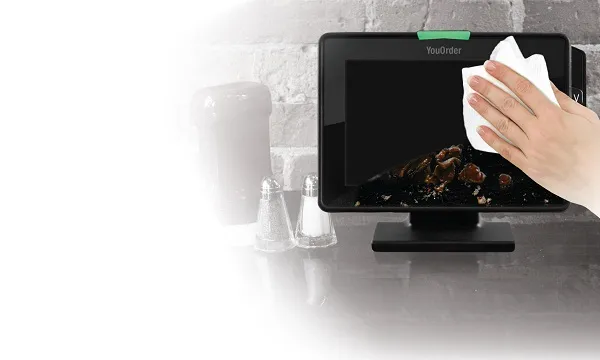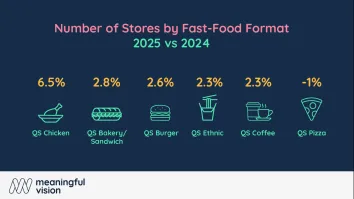
Touchscreen culture of QRS is putting hygiene at risk
Consumers are becoming increasingly aware of the hygiene risk in food environments.
Jon Edmond, European business development manager at Sani Professional, explains why the new touchscreen culture could be putting customer and staff hygiene at risk.
The availability of easy-to-use technology such as digital menus, touchscreen cash desks and self-service kiosks is providing quick service restaurants with myriad new options. Many are embracing the technology to enhance productivity, yet consumers are becoming increasingly aware of the hygiene risk in food environments.
Even though touchscreen technology is providing quick service restaurants with the edge that customers want, it is undeniable that many touchscreens are dirty and unhygienic which can turn-off customers and reflect badly on the reputation of the food service outlet.
Past research from Manchester Metropolitan University has found that the inside of a mobile phone was dirtier than the bottom of a shoe . With that said, it isn’t difficult to imagine what bacteria are lurking on the outside of a screen - where fingers and faces regularly come into contact.
Food service employees are constantly under pressure to turn tables around as quickly as possible and have to do this without sacrificing quality or impacting customer experience for a quick service restaurant. Spraying and wiping tables can be difficult under this pressure and unfortunately, touchscreens are usually overlooked, not being cleaned as often as they should, creating a hygiene problem.
The touchscreen culture is undeniably affecting hygiene standards. Research has found that one in five people do not wash their hands after visiting the toilet . Not only does this highlight why it’s so important for people to wash their hands before and after eating, it establishes why regular cleaning and sanitising of digital touchscreens – and having the correct tools to do so – is an essential requirement in the QSR industry.
The touchscreen ordering system is having a mixed impact on the industry. On one hand, touchscreens are a great way for customers to easily place their food orders. Yet, on the other, customers are becoming increasingly aware of the germs and bacteria on these surfaces. We are in an age of consumer awareness and many people are aware that the dangerous bacteria present in quick service restaurants can cause illnesses.
Now more than ever, food service providers must ensure a five-star hygiene rating as the customer expects no less today. I’ve known people walk out of a restaurant if the star rating is any lower. No restaurant wants this, therefore hygiene should always be up-to-standard.
Quick service restaurants can achieve this standard by ensuring that every surface that both employees and customers encounter is regularly sanitised. Food service employees may believe it could be difficult to effectively clean a touchscreen without damaging them. However, by using Sani Professional’s Screen Clean wipes, touchscreens can be cleaned to the highest of standards, eliminating all unwanted bacteria without damaging expensive touchscreens.
The regular use of screen wipes being used by staff, reassures customers of cleanliness and the high level of hygiene they are looking for. People don’t want to use screens which are covered in other people’s finger-prints. Sani Professional’s Clean Screen wipes have been designed specifically for the job – they are a one-step operation meaning screens can be cleaned in seconds.
The wipes can be used on a regular basis as the wipes apply the perfect dose of liquid and disinfectant to the surface and are made from non-linting, super soft cloth so won’t damage the screen.
Sani Professional, the food safety division of PDI, is committed to enhancing the efforts of food service professionals who prepare and serve meals by offering a range of sanitising solutions.
For further information, please visit: www.saniprofessional.co.uk.
























